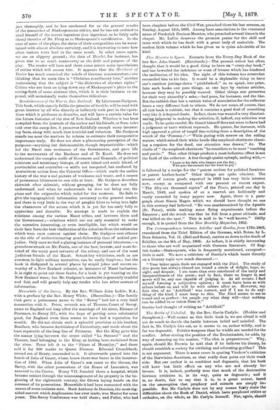Memorials of the Savoy. By the Rev. William John Loftie,
B.A., with a preface by the Rev. Henry White. (Macmillan.)—The family that gave a permanent name to the "Savoy" had but a very brief connection with it. Peter, seventh son of Thomas, Count of Savoy, came to England not long after the marriage of his niece, Eleanor of Provence, to Henry III., with the hope of getting some substantial good, for England even then seems to have had a reputation for wealth. He did not obtain such a splendid provision as his brother, Boniface, who became Archbishop of Canterbury, and made about the least reputable of the long line of Primates. But the King gave him the manor lying between the street called "La Straund" and the Thames, land belonging to the King, as having been reclaimed from the river. Peter left it to the " Friars of Mountjoy," and these sold it for 300 marks to Queen Eleanor. Edmund Cronchback, second son of Henry, succeeded to it. It afterwards passed into the hands of John of Gaunt, whose house there was burnt in the insurrec- tion of 1381. When John of Gaunt's son came to the throne, the Savoy, with the other possessions of the House of Lancaster, was annexed to the Crown. Henry VII. founded there a hospital, which became extinct through the mismanagement of its property in the be- ginning of the eighteenth century, the Crown laying hands on the remnant of its possessions. Meanwhile it had been connected with the names of some eminent men. Mark Anthony de Dominic, the most dig- nified convert which Anglicanism has ever made, was Master for some years. The Savoy Conference was held there ; and Fuller, who had
been chaplain before the Civil War, preached there his last sermon, on Sunday, August 12th, 1661. Among later associations is the venerated name of Frederick Denison Maurice, who preached several times in the chapel. Mr. Loftie deserves the greatest praise for the skill and taste with which he has dealt with a great body of materials. The modest little volume which he has given us is quite admirable of its kind.


































 Previous page
Previous page